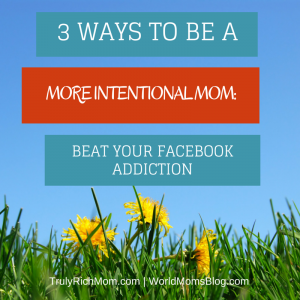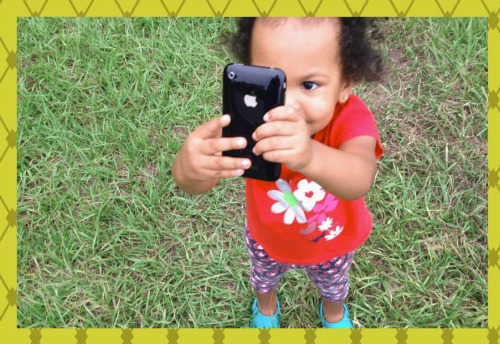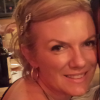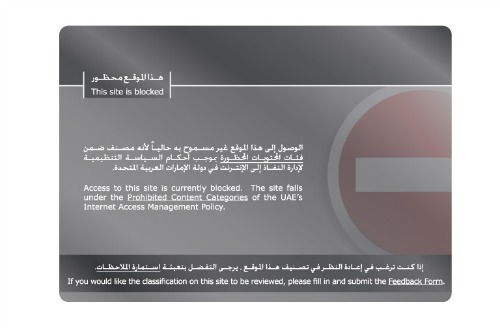
by Tina Santiago-Rodriguez (Philippines) | May 28, 2015 | 2015, Advice, Awareness, Being Considerate, Communication, Computers, Identity, Life Balance, Me-Time, Media, Motherhood, Parenting, Responsibility, Social Media, Tina Santiago-Rodriguez, Truly Rich Mom, World Motherhood
 I have a (rather embarrassing) confession to make: Lately, I have been guilty of being that mom who seems “addicted” to social media (gasp!).
I have a (rather embarrassing) confession to make: Lately, I have been guilty of being that mom who seems “addicted” to social media (gasp!).
You know, the one who finds herself reaching for her phone when she wakes up in the middle of the night, and immediately checks her Facebook feed. (*Sigh*)
The one who won’t look up from her phone when her child is talking to her, excited to share her latest creation, because she’s too busy reading what her “friends” have shared online.
The one who seems distracted during playtime and read-aloud time, because she is thinking of what she should post next on social media.
Yup. That mom.
Although I don’t consider myself as “badly addicted” as others might be (cough, cough), reading this CNN article about how you can check if you’re addicted to Facebook made me rethink how I have been spending my time online. I am ashamed to admit it but I sadly found myself checking off most of the items on the list! 🙁
Because of this, I’ve decided to declare to the world (fittingly, through this post, because, well, this blog represents people from all over the world, yes?) that I am going to do my best to be a more intentional mom…specifically when it comes to my use of Facebook.
Here are three things that I plan to do:
1. More Facetime, less Facebook.
I will have more “facetime” with my kids — more looking in their eyes when they speak to me, more kisses on their cheeks, more playtime and reading time. Basically, more “face-to-face” communication. 🙂
2. Limit access to my phone.
This may be a bit challenging to do, since I also use my phone for work, but I think I really need to do it. I plan to place my phone in a bag or closet during the times when I should be focused on the kids, like during mealtime, “learning time” or playtime. I will resist the urge to check my Facebook notifications, because they usually are not about anything urgent anyway.
3. Be more intentional with Facebook posts.
These tips on how to defeat a Facebook addiction reminded me again that, like many other things, Facebook is not necessarily an “evil” — it’s how we use it that leads to problems. So I think I’ll revisit my “One Word” for this year, and use Facebook less for “socializing” and more for inspiring and helping others.
For starters, I think I’ll focus more on sharing encouraging and inspirational posts on my Facebook page, rather than checking my personal Facebook feed all the time.
So this is what I plan to do. I hope that these action steps will truly help me to be a more intentional mom! (If you can relate to this post, I hope you found it useful — here’s to being more intentional with our kids!)
Do you have more tips for beating a Facebook addiction and being a more intentional mother to your children? Please share them in the comments!
Tina Santiago-Rodriguez is a wife and homeschool mom by vocation, a licensed
physical therapist by education and currently the managing editor of Mustard, a
Catholic children's magazine published by Shepherd's Voice
Publications in the Philippines, by profession. She has been writing
passionately since her primary school years in Brunei, and contributes
regularly to several Philippine and foreign-based online and print publications. She also does sideline editing and scriptwriting jobs, when she has the time. Find out more about Tina through her personal
blogs: Truly Rich Mom and Teacher Mama Tina.
More Posts

by Karyn Wills | Feb 26, 2015 | 2015, Adolescence, Awareness, Being Thankful, Boys, Brothers, Caring, Childhood, Computers, Family, Identity, Life, Life Lesson, Milestones, Motherhood, New Zealand, News, Older Children, Parenting, Rape, Responsibility, Responsibility, Sex, Sleep and Children, Social Media, Technology, Teenagers, World Motherhood
 On Saturday night, I had the privilege of hosting three of my 13 year-old son’s friends for a sleep-over. They are lovely boys, and all I have to do is feed them and ignore them. I don’t mention things like showers or teeth-brushing, and in return they pretty much keep to themselves and don’t expect me to converse about Minecraft, Clash of Clans or Team Fortress II.
On Saturday night, I had the privilege of hosting three of my 13 year-old son’s friends for a sleep-over. They are lovely boys, and all I have to do is feed them and ignore them. I don’t mention things like showers or teeth-brushing, and in return they pretty much keep to themselves and don’t expect me to converse about Minecraft, Clash of Clans or Team Fortress II.
I teased them a little about not letting girls in while I drove my 9 year-old to a birthday party. I didn’t make a big deal of things when one of them smuggled in cola. I laughed with them, when on my return from the party drop-off, they were trying to stuff MacDonalds packaging into my kitchen rubbish bin. They pushed their limits with bedtime, of course. And they declined the offer of mattresses to sleep on (too much work for them to get them into our lounge) and slept on the carpet…. because, they’re 13 and their bodies still bend in ways mine don’t.
It was both innocent and, I felt, an appropriate mix of mischief and compliance.
Then, on Sunday, I heard of other 13 year-olds who had been in online chat rooms, talking about anal-sex and rape. Not in general terms, but in…. I shall be doing this to you terms…. These are kids who come from great homes and who have very loving families. I immediately thought: there but the Grace of God go I.
Children easily get caught up with what their friends are doing, or those who they emulate. My 13 year-old could have easily been one of those involved and I have no doubt all three of my boys will make stupid mistakes as they move from childhood to adulthood. Just not this time. Thank goodness.
The biggest worry, for me, was that there was at least one unidentified person in the chat-group who could, quite literally, have been anyone. It’s probably another 13 year-old, a friend or acquaintance but it could just as easily be a predator who was scoping for a target. And that makes it all the more scary.
The same is true of a local man who is hanging around liquor stores offering to buy alcohol and cigarettes for underage kids, 14 and 15 year-olds. He does this for a while. Then he offers drugs. Then it’s parties at his house. This is a whole different scenario from the stranger-danger I taught my boys when they were small.
We’re talking about people who are consciously befriending those kids who want to seem older than they are, and who are ready to break rules. They are grooming relationships before they pounce. They are feeding the teenage need to belong and the teenage need to experiment and do things that their parents may not approve of.
So we hit the teenage years, and now I find parenting is not so black and white.
No, I don’t want my kids drinking alcohol or smoking but do I buy them a few beers to take to a party, so that creeps don’t target them and they go behind my back? No, I don’t want my kids smoking pot but if they choose to, should I allow it when they know who grew it, rather than have them turn to those who lace it with P?
No, I don’t want my kids to be suggesting they will rape someone or perform anal sex on them, but I also don’t want them to be excluded from other things their peers are doing.
Suddenly, a conversation about Minecraft seems pretty appealing afterall.
What do you do or have you done to deal with these aspects of parenting?
This is an original post to World Moms Blog from our writer and mother of three, rapidly growing boys in New Zealand, Karyn Willis.
The image used in this post is attributed to JD Hancock and holds a Flickr Creative Commons attribution license.
Karyn is a teacher, writer and solo mother to three sons. She lives in the sunny wine region of Hawke’s Bay, New Zealand in the city of Napier.
More Posts

by Ecoziva (Brazil) | Nov 17, 2014 | 2014, Being Thankful, Brazil, Communication, Computers, Sexual Assault, Social Media, Uncategorized
 Imagine the scene: an eight year old girl with a Facebook account – allowed for by her parents. I will call her Maria. Maria’s parents both work full time and after school she stays at home with the maid. She has full access to the computer and knows how to navigate the Internet quite well.
Imagine the scene: an eight year old girl with a Facebook account – allowed for by her parents. I will call her Maria. Maria’s parents both work full time and after school she stays at home with the maid. She has full access to the computer and knows how to navigate the Internet quite well.
Several hundred kilometers away, a grown man creates a fake Facebook account using childhood photographs of a famous teenage singer. He contacts Maria and she accepts him as her online friend. They chat. At one point he says he loves going to the beach and sends her a picture of the singer, when around age eight, at the beach. “I also love going to the beach!” she says and, when prompted, sends him a picture of herself at the beach wearing a bikini.
The friendship progresses over several days. Maria is happy because she and the cute boy seem to have a lot in common. One day he asks for her phone number. He says his birthday is coming up and he wants to invite her. Using a child’s voice, he talks to her briefly and then asks if she can talk to his father. The “father” says the “birthday” will be a lot of fun: he will pick her up at school and take them to the mall, to the movies, for ice cream and other fun things.
He also tells her not to worry about talking to her parents. He will call them later and they will work everything out.
The day of the “birthday” arrives. The man gets to Maria’s school and tells the porter he is her uncle. The porter says he will have to call Maria’s parents to get permission for her to go with him. “No problem,” he says, “while you call I will go pick her up in her classroom”. Her parents deny the story and the man is not able to leave the school grounds with Maria. At this point the school staff has started to get suspicious and they are able to record the number of his license plate and inform the police.
The man is later intercepted at the state border. He has a criminal record and has already spent time in prison for molesting children. Unfortunately, as there was no formal accusation, the police are not able to arrest him.
The scary situation I described above is a true story that happened to the daughter of one of my husband’s colleagues. The topic came up in a talk how nowadays children are so computer savvy, and my husband commented on how we limit the kids’ screen time: we have no TV set at home; the eldest has limited time on the Internet and no social media or e-mail accounts; and, more recently, we have cut all screen time for the two smaller kids (both under four) with the exception of days at grandma’s and the rare trip to the movie theater. At that point the co-worker stated that nowadays it is impossible to control kids’ screen time and recounted what happened to his girl.
Valdemar Setzer*, a professor at the Computer Science Department of the University of São Paulo (USP) researches the impacts of screens on children and advocates that kids – for lack of maturity – should have no access whatsoever to the Internet (teens included). I recently heard him talk and a lot of what he said only confirmed my own opinions and reinforced the hard decision of eliminating all screen time for my two youngest kids at home.
On the other hand, it also got me thinking about how part of the problem doesn’t have to do with the screens themselves: it is much more about parents and children who spend way too little (quantity) time together, parents who overwork to make ends meet and are (understandably) too tired to play or do outdoor activities with the kids and the end of the day or during the weekends, or simply parents and kids which communication needs to improve a lot.
I am not trying to be judgmental here – I am grateful my job is flexible and allows me to have a lot of time with my kids, but I know other parents are not so fortunate.
However, even in my case stories like this make me once again rethink my priorities and find ways to organize our family life, as there is always room for improvement. After all, there is nothing more important to me that my children, and I believe that is the case for most parents. Also, despite all the benefits the Internet and other new means of communication have brought about (such as bringing together mothers from around the world in this blog!), for me real, active life is always better than the passive life that goes on “behind the screens” – not only for children, but for adults too!
And you, do you control your children’s screen time? If so, how? Please share your story!
[*] Prof. Setzer’s website is loaded with information on the effects of screens on children, including stuff in English – http://www.ime.usp.br/~vwsetzer/
This is an original post to World Moms Blog by Eco Ziva of Brazil. Photo credit: Sinistra Ecologia Libertá. This picture has a creative commons attribution license.
Eco, from the greek oikos means home; Ziva has many meanings and roots, including Hebrew (brilliance, light), Slovenian (goddess of life) and Sanskrit (blessing). In Brazil, where EcoZiva has lived for most of her life, giving birth is often termed “giving the light”; thus, she thought, a mother is “home to light” during the nine months of pregnancy, and so the penname EcoZiva came to be for World Moms Blog.
Born in the USA in a multi-ethnic extended family, EcoZiva is married and the mother of two boys (aged 12 and three) and a five-year-old girl and a three yearboy. She is trained as a biologist and presently an university researcher/professor, but also a volunteer at the local environmental movement.
More Posts

by ThinkSayBe | Oct 3, 2014 | 2013, 2014, Awareness, Babies, Childhood, Communication, Computers, Discipline, Education, Entertainment, Environment, Family, Girls, Kids, Life, Life Balance, Motherhood, Nature, Parenting, Technology, ThinkSayBe, Uncategorized, USA, World Moms Blog, World Motherhood, Younger Children
 “Yes please, yes please, yes pleeeeease!” is what I hear almost every time my toddler sees or hears my phone. If she does not get it, she isn’t too happy. She may move on to playing with something else, but sometimes comes back pointing at where she last saw my phone, and says “yes please!” again. (more…)
“Yes please, yes please, yes pleeeeease!” is what I hear almost every time my toddler sees or hears my phone. If she does not get it, she isn’t too happy. She may move on to playing with something else, but sometimes comes back pointing at where she last saw my phone, and says “yes please!” again. (more…)
I am a mom amongst some other titles life has fortunately given me. I love photography & the reward of someone being really happy about a photo I took of her/him. I work, I study, I try to pay attention to life. I like writing. I don't understand many things...especially why humans treat each other & other living & inanimate things so vilely sometimes. I like to be an idealist, but when most fails, I do my best to not be a pessimist: Life itself is entirely too beautiful, amazing & inspiring to forget that it is!
More Posts
Follow Me:


by Sisters From Another Mister | Sep 16, 2014 | 2014, Awareness, Communication, Computers, Homeschooling, Social Good, World Moms Blog
I love this quote … “Never doubt that a small group of thoughtful, committed citizens
can change the world. Indeed, it is the only thing that ever has.”
― Margaret Mead
In fact, I like it so much that I made you a pin.

We get so very caught up in the busyness of life, that it is easy to say – oh what can I do? Where will my voice be heard? How could just one person make a difference? And if everyone felt that way, then truly, nothing at all would be done and life would simply stagnate or deteriorate into some awful quagmire of miserable fate … or something equally dramatic.
But if you speak up, even just a little and find a cause that speaks to your heart – you will actually be heard. I know this for sure, and not only has my voice been heard, but my life has been enriched by the relationships forged with those who want to make a difference. Doors have opened and led me down new paths, and it is as though bright windows of light have reached deep into my soul for how very blessed I have been. (more…)

Sisters From Another Mister ...
A blog born from the love of 'sisters' around the world who come together to lift eachother up no matter where they are on their life journey.
Meet Nicole, a transplanted British born, South African raised, and American made Mom of two girls living on the sunny shores of South Florida, USA. A writer of stories, an avid picture taker and a keeper of shiny memories.
Sharing the travels of a home school journey that takes place around the globe - because 'the world truly is our classroom'. Throw in infertility, adoption, separation, impending divorce (it has its own Doom and Gloom category on the blog) and a much needed added side of European humor is what keeps it all together on the days when it could quite clearly simply fall apart! This segues nicely into Finding a Mister for a Sister for continued amusement.
When not obsessing over the perils of dating as an old person, saving the world thro organisations such as being an ambassador for shot@life, supporting GirlUP, The UN Foundation, ONE.org and being a member of the Global Team of 200 for social good keeps life in the balance.
Be sure to visit, because 'even tho we may not have been sisters at the start, we are sisters from the heart.'
http://www.sistersfromanothermister.com/
https://www.facebook.com/SistersFromAnotherMister
https://twitter.com/thesistershood
http://pinterest.com/thesistershood/
Global Team of 200 #socialgoodmoms
Champion for Shot@Life and The United Nations Foundation
More Posts - Website
Follow Me:




by Mannahattamamma (UAE) | Mar 19, 2014 | 2014, Computers, Cultural Differences, Culture, Education, Expat Life, Government, Homeschooling, Living Abroad, Multicultural, Older Children, Politics, Religion, School, Social Media, Traditions, UAE, USA
 I always swore I would never home-school my children. I know many people do, and do it quite successfully, but I’m awfully fond of the quiet that descends on my house after they’ve tromped off to school. If that tromping were only happening from the bedroom to, say, the kitchen table, I think I might simply lock myself in the bathroom and never come out.
I always swore I would never home-school my children. I know many people do, and do it quite successfully, but I’m awfully fond of the quiet that descends on my house after they’ve tromped off to school. If that tromping were only happening from the bedroom to, say, the kitchen table, I think I might simply lock myself in the bathroom and never come out.
But as so often happens, my vow has collided with reality and I have found myself, in recent weeks, trolling home-schooling websites in search of teaching resources. My kids are now 9 (nine and a half, he would say indignantly) and 13; they go to a British school here in Abu Dhabi. That means they’ve spent a lot of time learning various English kings and queens, although they can’t recite them all in order. They study “maths,” and do prep rather than homework; they study English history and geography; they read mostly English writers in their literature classes. In addition to all those Anglo studies, they take Arabic language classes four days a week and once-weekly class called “Islamic Studies.” The Arabic classes are mandated by ADEC (Abu Dhabi Education Council) and I have to say, I’m much more interested in my kids learning Arabic than I am in their ability to name all the English kings and queens.
Having the boys be in an English system has been a learning curve for all of us. We’re learning two languages, actually, Arabic and, well, English: the boys now live in a world where things are “grey,” luggage goes in the “boot,” and we put garbage in the “bin.”
I’m not considering a dabble in the home-schooling system in order to beef up my boys’ appreciation of the Queen’s English, however. My kids, like every schoolchild in the country, have a curriculum that is at least in part determined by the UAE government, and that means there are things that aren’t supposed to be taught. I live in a place where censorship happens and where, unlike the States, the policies cannot be overtly challenged in the courts. So, for instance, in the States if you live in a town where they want to ban the Harry Potter books, you can take the school district to court. Not here.
We had to sign a permission slip so that our older son could get the science textbook that included the chapter on reproduction (with pictures of, you know, the embarrassing bits); his Latin class translates vinum as … grape, not wine. These are relatively small annoyances, although of course they are far from ideal.
There are, however, more serious concerns in terms of what shouldn’t be included in history courses and literature courses, and that’s where I find myself trolling the home-schooling sites for resources. The Holocaust can’t be taught here; Israel and Judaism are not supposed to be mentioned here; communism isn’t supposed to be discussed; evolution isn’t supposed to be taught; and the list goes on. Sometimes it feels as if we’re living in some kind of Bible-thumping town in the rural U.S and I realize, yet again, that fundamentalism can be seen as a global phenomenon that differs only in the nature of its prohibitions: the fear that motivates the prohibitions stays constant.
Before you leap to any conclusions, please know that the Muslim families I know are as frustrated by these government-issued edicts as are the non-Muslim families and many of us have talked together about what we can do to help our children gain a full picture of the world, regardless of what the government says. So it is that what in some contexts (living in Manhattan, for instance) would be a purely theoretical discussion has become in our household, a very pragmatic series of conversations.
Think about it: how would you talk to your kids about censorship? Is censorship always bad? Think about your children, if you have them, and the internet: are there sites you say they can’t see, or have you put a filter or something on your computer to prevent certain kinds of access? Do we agree that there is such a thing as “good” censorship? (Because of that whole teenage-boy-surfing-the-internet thing, I see a (slight) upside to living in a “nanny state.” I am fairly sure that if he wanted to look, my son wouldn’t be able to find basic porn–not to say that if he really wanted to dig around he couldn’t elude the censors, but at this point, I think his porn-directed vocabulary is still too limited to get around the government blocks. I guess we file that under “thank goodness for small favors,” right? )
My husband and I are both professors, and so we are able to bolster and supplement what isn’t happening in school, but we are also having a lot of conversations with our kids about censorship, politics, and the necessity of thinking about things in ways that are different from how we might think about them. We point out that the UAE isn’t Saudi Arabia; there is no Taliban here; the country is not governed by a theocracy of any sort. We know Jewish families who live here; I know gay couples who live here; a Mormon family lives next door to us. I see people on the beach in the scantiest of scanty bathing suits.
Living here means coming to term with nuance, with ambiguity, with living in a world that is organized around “both/and,” rather than “either/or.” The country is progressive and conservative; censorship is a problem that has a context; learning happens as much from what is not there as it does from what is there. It’s complicated and let’s be honest — no nine year old, no thirteen year old—and very few adults—really likes ambiguity. After all, if there is no “in-between” answer, life becomes much easier, doesn’t it?
No, of course I’m not happy that my kids have a biology textbook with the word “pig” marked out. Of course, I’m also not pleased that the Anglo-centric curriculum also neglects things like the US Civil War, other than in the most general sense. But I will say that I think it is, and will continue to be, a powerful learning experience for my children (and us) to have to confront and think about what it means to live in a place where the government attempts to exert such extensive control. I like to think that, paradoxically, these attempts at censorship will make my children more open-minded adults.
Have you ever been confronted with censorship? How have you dealt with it?
After twenty-plus years in Manhattan, Deborah Quinn and her family moved to Abu Dhabi (in the United Arab Emirates), where she spends a great deal of time driving her sons back and forth to soccer practice. She writes about travel, politics, feminism, education, and the absurdities of living in a place where temperatures regularly go above 110F.
Deborah can also be found on her blog, Mannahattamamma.
More Posts
Follow Me:


 I have a (rather embarrassing) confession to make: Lately, I have been guilty of being that mom who seems “addicted” to social media (gasp!).
I have a (rather embarrassing) confession to make: Lately, I have been guilty of being that mom who seems “addicted” to social media (gasp!).





 “Yes please, yes please, yes pleeeeease!” is what I hear almost every time my toddler sees or hears my phone. If she does not get it, she isn’t too happy. She may move on to playing with something else, but sometimes comes back pointing at where she last saw my phone, and says “yes please!” again.
“Yes please, yes please, yes pleeeeease!” is what I hear almost every time my toddler sees or hears my phone. If she does not get it, she isn’t too happy. She may move on to playing with something else, but sometimes comes back pointing at where she last saw my phone, and says “yes please!” again. 









